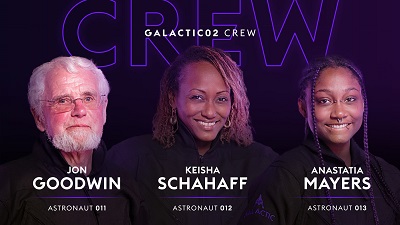San Francisco, (Samajweekly) After the success of its first-ever commercial spaceflight, Richard Branson’s Virgin Galactic has announced the second, aiming to launch it on August 10.
Galactic 02, which will be Virgin Galactic’s “seventh spaceflight and second commercial spaceflight”, will fly three private passengers, including the first Olympian and first Caribbean astronauts, to space, the company said, in a statement on Monday.
VSS Unity will carry Jon Goodwin, an 80-year-old, Olympian and early Virgin Galactic ticket holder, as well as Keisha Schahaff and Anastatia Mayers, a Caribbean mother-daughter duo who won their seats in a draw that raised funds for non-profit Space for Humanity.
The dynamic and multinational crew highlights the role the commercial space industry can play in removing barriers that once existed to becoming an astronaut, the company said.
“This flight highlights two of Virgin Galactic’s core aspirations — increasing access to space and inspiring people around the world,” said Virgin Galactic CEO Michael Colglazier, in the statement.
“Each of these astronauts are role models and beacons of inspiration in their communities. Watching Keisha, Ana and Jon embark on this transformative experience helps demonstrate that space is now opening to a broader and more diverse population across the globe,” he added.
Virgin Galactic’s start to commercial service comes after years of delays and setbacks.
The company aced Galactic 01, with four passengers and two pilots on June 29. It also carried 13 experiments for collecting medical and cosmic radiation data and studying fluid dynamics.
Virgin Galactic is now among aerospace companies, along with Elon Musk’s SpaceX and Jeff Bezos’s Blue Origin, that can ferry paying customers to space.
A typical flight includes reaching around 50,000 feet of altitude, and from there, VMS Eve drops VSS Unity for the spaceplane to blast its way to suborbital space, allowing passengers to experience a few moments of weightlessness.
About 800 tickets have reportedly been sold over the past decade, with the initial batch going for $200,000 each. Tickets now cost $450,000 per person.










